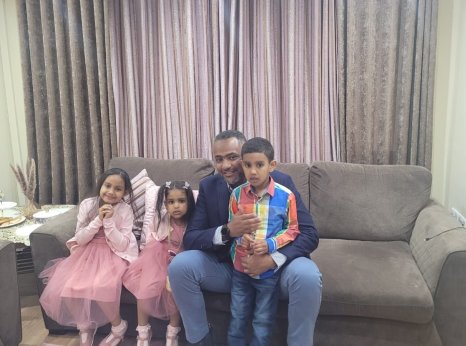Saudi Arabia: British National Sentenced To 8 Years In Prison

Ahmed al-Doush has had multiple trial hearings. He was assigned a court-appointed lawyer at his first hearing on 27 January 2025, but he is not permitted regular communication with him. As a result of restrictions by prison authorities to what he can share with his wife during his phone calls with her, which he communicated to her in April 2025, she has not received detailed information about his court proceedings, including details regarding the basis for his conviction, or the charges or evidence against him, nor updates on prison conditions or his health.
The SCC sentenced Ahmed al-Doush to 10 years in prison on 12 May 2025. The sentence was reduced to eight years in prison at an appeal hearing on 23 June 2025. Ahmed al-Doush was summoned without notice to the appeal hearing where the judge and his lawyer in Saudi Arabia were present. The judge informed him that his conviction was confirmed and that his sentence was reduced from 10 years to 8 years. The UK government, Ahmed al-Doush’s family and his lawyer in the United Kingdom have not received information on his charges or the basis of his conviction.
Ahmed al-Doush’s charges appear to be expression-related. Ahmed al-Doush was subjected to extensive interrogation without a lawyer present and before being informed of the charges against him. During interrogations, he said to his family that he was told that if not for his social media activity, he would be home with his family. Notably, his X account has only 37 followers and a total of four posts. In his first hearing, a judge told him that charges would be issued for using social media to spread fake, untrue and damaging news against the Kingdom of Saudi Arabia, and that he was accused of having a relationship with an individual who threatened the Kingdom's national security.
The SCC has routinely used vague provisions under the anti-cybercrime and counter-terror laws equating peaceful expression with “terrorism”. Amnesty International has documented how every stage of the SCC judicial process is tainted by human rights violations.
For two and a half months after his arrest on 31 August 2024, Ahmed al-Doush's family was denied any communication with him. They were also not given information about his situation or the reason for his arrest. His wife and children were left in the dark about his well-being, his conditions of detention and whether and when he might be allowed to return home. He was also denied consular access to UK government representatives during this time, severely hindering the UK government and his family’s ability to gather information about him, his detention and steps they might take to facilitate his release. It wasn’t until 17 November 2024 that Ahmed al-Doush was allowed a call to his wife. He was then permitted weekly phone calls with his family. However, in January, these calls were interrupted and have now become sporadic. He later told his family that his communication with them was restricted by the authorities as punishment for asking his wife during a call about people that had recently been released in Saudi Arabia.
Since his arrest, Ahmed al-Doush has been permitted multiple consular visits from the British embassy in Riyadh, with the first consular visit on 21 November 2025, nearly three months after his arrest. Ahead of the visit, the UK government did not share any information known about his detention, status or well-being with his family, claiming this was on the grounds of data protection.
Since 2013, Amnesty International has documented the cases of 86 individuals prosecuted solely for exercising their rights to freedom of expression, association and peaceful assembly. Of those, 40 were prosecuted for legitimate exercise of the right to freedom of expression on social media. Amnesty International is aware that the real number of such prosecutions is likely much higher. Legal proceedings in these cases fall far short of international fair trial standards. Individuals are often held incommunicado without charge, in solitary confinement and denied access to lawyers or the courts to challenge the lawfulness of their detention.